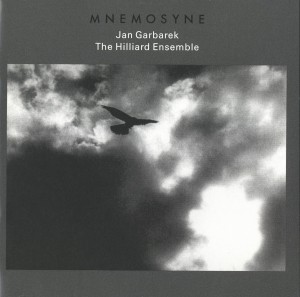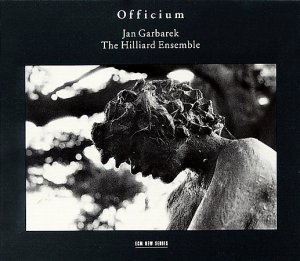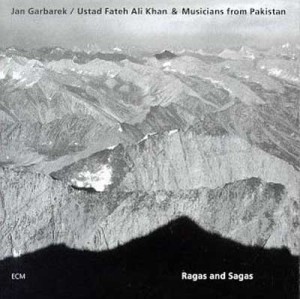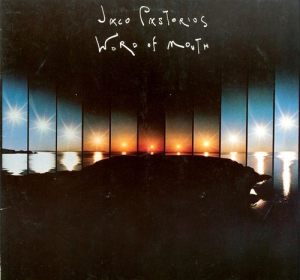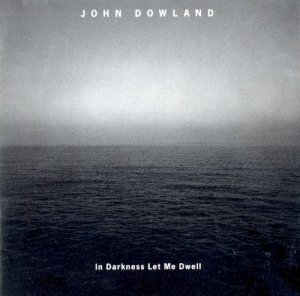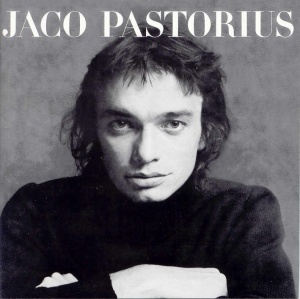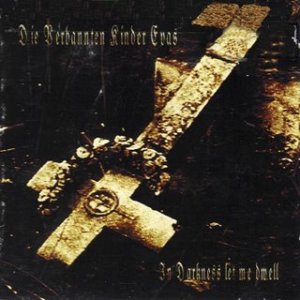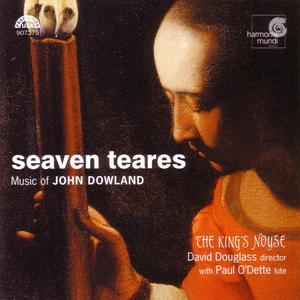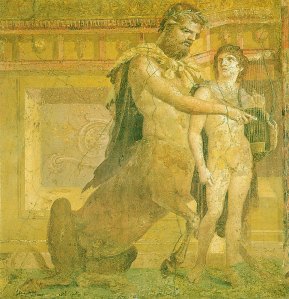(Greek original 2nd century BC) Achilles Educated by the Centaur Chiron, wall painting, Museo Archeologico, Napoli, Inv 9109.
This is one of the scenes included in Philostratus’ Eikones (Images). The education here represented is being conducted through the media of the lyre, i.e., the celestial music of Apollo, in opposition to the earthly music of Dionysios generally conducted through the flute.
There’s a poem by W. H. Auden that reflects about the academic milieu into which he was in 1946. The metaphors are classically taken from Greek Mythology:
W. H. Auden (1907-1973)
A REACTIONARY TRACT FOR THE TIMES
(Phi Beta Kappa Poem, Harvard, 1946)
Ares at last has quit the field,
The bloodstains on the bushes yield
To seeping showers,
And in their convalescent state
The fractured towns associate
With summer flowers.
Encamped upon the college plain
Raw veterans already train
As freshman forces;
Instructors with sarcastic tongue
Shepherd the battle-weary young
Through basic courses.
Among bewildering appliances
For mastering the arts and sciences
They stroll or run,
And nerves that steeled themselves to slaughter
Are shot to pieces by the shorter
Poems of Donne.
Professors back from secret missions
Resume their proper eruditions,
Though some regret it;
They liked their dictaphones a lot,
T hey met some big wheels, and do not
Let you forget it.
But Zeus’ inscrutable decree
Permits the will-to-disagree
To be pandemic,
Ordains that vaudeville shall preach
And every commencement speech
Be a polemic.
Let Ares doze, that other war
Is instantly declared once more
‘Twixt those who follow
Precocious Hermes all the way
And those who without qualms obey
Pompous Apollo.
Brutal like all Olympic games,
Though fought with smiles and Christian names
And less dramatic,
This dialectic strife between
The civil gods is just as mean,
And more fanatic.
What high immortals do in mirth
Is life and death on Middle Earth;
Their a-historic
Antipathy forever gripes
All ages and somatic types,
The sophomoric
Who face the future’s darkest hints
With giggles or with prairie squints
As stout as Cortez,
And those who like myself turn pale
As we approach with ragged sail
The fattening forties.
The sons of Hermes love to play
And only do their best when they
Are told they oughtn’t;
Apollo’s children never shrink
From boring jobs but have to think
Their work important.
Related by antithesis,
A compromise between us is
Impossible;
Respect perhaps but friendship never:
Falstaff the fool confronts forever
The prig Prince Hal.
If he would leave the self alone,
Apollo’s welcome to the throne,
Fasces and falcons;
He loves to rule, has always done it;
The earth would soon, did Hermes run it,
Be like the Balkans.
But jealous of our god of dreams,
His common-sense in secret schemes
To rule the heart;
Unable to invent the lyre,
Creates with simulated fire
Official art.
And when he occupies a college,
Truth is replaced by Useful Knowledge;
He pays particular
Attention to Commercial Thought,
Public Relations, Hygiene, Sport,
In his curricula.
Athletic, extrovert and crude,
For him, to work in solitude
Is the offence,
The goal a populous Nirvana:
His shield bears this device: Mens sana
Qui mal y pense.
Today his arms, we must confess,
From Right to Left have met success,
His banners wave
From Yale to Princeton, and the news
From Broadway to the Book Reviews
Is very grave.
His radio Homers all day long
In over-Whitmanated song
That does not scan,
With adjectives laid end to end,
Extol the doughnut and commend
The Common Man.
His, too, each homely lyric thing
On sport or spousal love or spring
Or dogs or dusters,
Invented by some court-house bard
For recitation by the yard
In filibusters.
To him ascend the prize orations
And sets of fugal variations
On some folk-ballad,
While dietitians sacrifice
A glass of prune-juice or a nice
Marsh-mallow salad.
Charged with his compound of sensational
Sex plus some undenominational
Religious matter,
Enormous novels by co-eds
Rain down on our defenceless heads
Till our teeth chatter.
In fake Hermetic uniforms
Behind our battle-line, in swarms
That keep alighting,
His existentialists declare
That they are in complete despair,
Yet go on writing.
No matter; He shall be defied;
White Aphrodite is on our side:
What though his threat
To organize us grow more critical?
Zeus willing, we, the unpolitical,
Shall beat him yet.
Lone scholars, sniping from the walls
Of learned periodicals,
Our facts defend,
Our intellectual marines,
Landing in little magazines
Capture a trend.
By night our student Underground
At cocktail parties whisper round
From ear to ear;
Fat figures in the public eye
Collapse next morning, ambushed by
Some witty sneer.
In our morale must lie our strength:
So, that we may behold at length
Routed Apollo’s
Battalions melt away like fog,
Keep well the Hermetic Decalogue,
Which runs as follows:—
Thou shalt not do as the dean pleases,
Thou shalt not write thy doctor’s thesis
On education,
Thou shalt not worship projects nor
Shalt thou or thine bow down before
Administration.
Thou shalt not answer questionnaires
Or quizzes upon World-Affairs,
Nor with compliance
Take any test. Thou shalt not sit
With statisticians nor commit
A social science.
Thou shalt not be on friendly terms
With guys in advertising firms,
Nor speak with such
As read the Bible for its prose,
Nor, above all, make love to those
Who wash too much.
Thou shalt not live within thy means
Nor on plain water and raw greens.
If thou must choose
Between the chances, choose the odd;
Read The New Yorker, trust in God;
And take short views.
